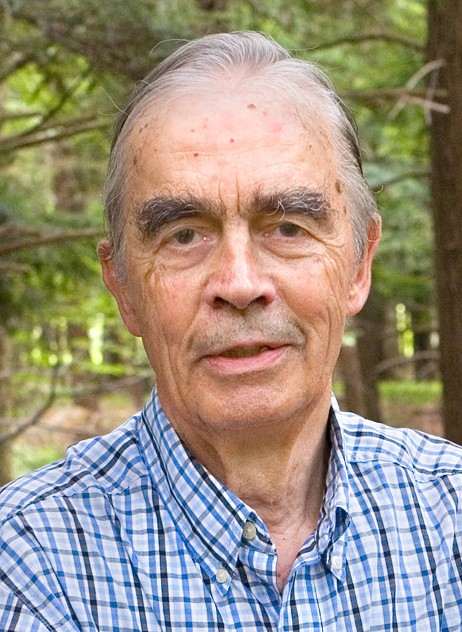Peter Harriott ’49, chemical engineering pioneer, dies at 94
By Chris Dawson
Peter Harriott ’49, an emeritus professor of chemical engineering who taught for 48 years at Cornell and co-authored the defining textbook on unit operations, died Sept. 23 in Ithaca. He was 94.
Harriott joined the faculty of what was then the School of Chemical Engineering in 1953 and worked closely with some of the school’s founders, including professors Fred H. “Dusty” Rhodes and Julian Smith. Harriott spent the next 48 years teaching undergraduate and graduate chemical engineering students about process control, chemical reactor design, and membrane and synthetic fuels. He supervised graduate research in process control, mass transfer, kinetics, air pollution control and reactor design until his retirement in 2001.
For many years after retirement, Harriott continued to give guest lectures in several classes at the Robert Frederick Smith School of Chemical and Biomolecular Engineering. He especially enjoyed joining first-year students on their final day of the semester so that could teach them his “Reynold’s Number Song” about predicting fluid flow patterns.
“In many ways, Peter was the last of his generation of Cornell chemical engineers,” said Susan Daniel, the Fred H. Rhodes Professor and William C. Hooey Director of Chemical and Biomolecular Engineering. “He was a founding father of the department and a pioneer who helped to defined the attributes of the chemical engineering mindset.”
Harriott was born in Ithaca in 1927 to parents who were both members of Cornell’s Class of 1922. In a recorded interview arranged by Cornell, Harriott revealed that in the seventh grade his teacher asked him to predict his own future and without missing a beat he said, “I will go to Cornell University and I will be a chemical engineer.”
Harriott graduated from Cornell with a degree in chemical engineering in 1949. He earned his doctorate from the Massachusetts Institute of Technology in 1952 and worked for General Electric in Schenectady, New York, for a year before getting an unsolicited call from Professor Charles Winding at Cornell, offering a faculty position.
That same year, Harriott met and married his lifelong partner, Mary Lou (White) Harriott. Harriott later said it was by far the most momentous year of his life because marrying his wife and teaching at Cornell were the two best decisions he ever made. He and his wife designed and helped construct their house in Ellis Hollow in 1955, where they raised five sons, all of whom studied engineering.
Outside of Cornell, Harriott is best known for the 1956 textbook “Unit Operations of Chemical Engineering,” which is still widely in use and considered by many to be one of the most comprehensive introductory undergraduate chemical engineering textbooks ever written. The book is currently in its seventh edition, with Harriott adding chapters with each new edition, up to and including the most recent in 2005. In 2008 he was presented with the Warren K. Lewis Award for Chemical Engineering Education by the American Institute of Chemical Engineers in honor of his deep commitment to his students and to the field.
Jeff Tester ‘66, M.S. ‘67, the David Croll Sesquicentennial Fellow and professor of chemical and biomolecular engineering, was both a student and a colleague of Harriot’s.
“I was privileged as a senior ChemE student to have Peter as the instructor; he was always forthcoming to make sure we understood the key issues.” Tester said. “Later in my career, I had a chance to interact with him on several research topics. He had a unique ability to focus his knowledge of chemical engineering fundamentals and operations on solving complex engineering problems.”
Away from work, Harriott had a deep and abiding love of nature and the outdoors. He was an active member of the Nature Conservancy and the Adirondack Mountain Club, founder of the Cayuga Trails Club, and worked for many years with the Tompkins County Environmental Management Council. He was a Boy Scout leader for many years. Harriott also loved singing. For most of his adult life he was part of a chorus or singing group.
Harriott was predeceased by his wife, Mary-Lou Harriott, and a son, John Harriott. He is survived by sons George, James, Paul and Douglas Harriott, as well as seven grandchildren and two great-grandchildren.
A memorial service will be held in the spring.
Chris Dawson is a writer and brand manager for the College of Engineering.
Get Cornell news delivered right to your inbox.
Subscribe

